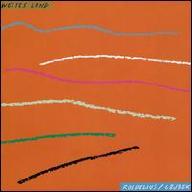Born in Berlin in 1934, Roedelius drifted through a series of odd jobs before turning to music, later collaborating with conceptual artist Conrad Schnitzler in a series of experimental bands including Plus/Minus, Noises, and the Human Being. In 1968, Roedelius and Schnitzler were among the co-founders of the Zodiak Free Arts Lab, a group of avant-garde artists from a variety of creative disciplines that quickly became one of the driving forces of the Berlin underground scene; with Dieter Moebius, they formed Kluster in 1969, performing extended improvisational live dates throughout West Germany.
Cluster released their debut LP, Klopfzeichen, in 1970; in the wake of their third album, 1971's Kluster und Eruption, Schnitzler exited to pursue a solo career, and Roedelius and Moebius continued on as Cluster. Working with famed producer Konrad Plank, the duo began to move increasingly toward more structured soundscapes -- with 1974's Zuckerzeit, they even pursued an electronic pop sound similar in spirit to Kraftwerk. Roedelius and Moebius also teamed with Neu!'s Michael Rother in Harmonia, releasing a pair of mid-'70s LPs that caught the attention of Brian Eno, who in response collaborated with the trio on a legendary session (released much later as Harmonia Eno '76 Remixes), heralding a turn toward ambient textures (and influencing the sound of the 1976 Cluster album Sowiesoso). Roedelius and Moebius subsequently worked with Eno on 1977's Cluster and Eno and 1979's After the Heat as well.
In the interim, Roedelius made his solo debut with 1978's Durch die Wüste; after Cluster went on hiatus in the wake of 1981's Curiosum, he plunged fully into solo work, regularly releasing several new LPs each year. Although most of these projects pursued ambient paths -- the multi-chapter Selbstportrait series, 1981's Lustwandel, 1987's Momenti Felici, and 1992's Friendly Game all being good examples -- others, like 1982's Offene Türen and 1994's Sinfonia Contempora, No. 1, explored more dissonant electronic soundscapes. Additionally, Roedelius worked in a series of mediums including theater, dance, and film, collaborating with everyone from Holger Czukay to Peter Baumann; in 1990, he and Moebius also reunited for Apropos Cluster, and the duo continued working together throughout the decade to follow, though they formally severed musical ties in 2011, and Roedelius formed the musical ensemble Qluster with Onnen Bock.
Collaboration became Roedelius' primary M.O. from the '90s on, though he continued to issue volumes in his Selbstportrait series, which, as of 2013, numbered eight volumes. The list of his musical partners is not only a who's who of electronic musicians and pioneers, but also of modern composers. Some of his most notable recordings in the '90s also included the solo Tace! in 1993; One Hour with Cluster and Sinfonia Contempora, No. 1: Von Zeit zu Zeit in 1994; Pink, Blue and Amber in 1996; and Meeting the Magus in collaboration with electronics duo Aqueous in 1997 as well as Drive, by the one-shot band Global Trotters, who also included Alquimia, David Bickley, Felix Jay, Kenji Konishi, and Susumu Hirasawa.
At the beginning of the 21st century, Roedelius accelerated his already prolific output. While his first offering of the new decade was the solo ambient Roedeliusweg, he soon began a wide-ranging series of collaborative projects. Some of the most notable were the collage Veni Creator Spiritus with Eric Spitzer-Marlyn in 2000. The Japanese-only release Acon 2000/1 in collaboration with electronics legend Conrad Schnitzler offered a startling contrast between both men's styles. In 2003, joint projects accounted for two of his three releases, including Imagine Imagine, the first of his three albums with the Fratellis. The ambient solo offering Amerika Recycled was his only album released in 2004. Nevertheless, one of his most compelling releases, an ambient classical crossover project with pianist Morgan Fisher, was issued in 2005.
Cluster reunited for a tour in 2007; a live document Berlin 07 was released in 2008, along with Errata, which found him in an unlikely partnership with classical musician Tim Story and the dark, electronic soundscape artist Dwight Ashley. The last year of the first decade of the century was marked by Sustanza di Cose Sperata, with the brilliant and wildly idiosyncratic new music pianist and composer Alessandra Celletti. That year also saw the release of Qua, the final studio album by Cluster.
Roedelius began a new working partnership in 2010, this one with producer and electronic pop musician Stefan Schneider (aka Mapstation) of To Rococo Rot and Kreidler. Their first album together was Stunden, released by Bureau B. Roedelius evolved Cluster into Qluster, in collaboration with Berlin musician Onnen Bock; Fragen and Rufen both appeared on Bureau B in 2011, with Antworten arriving the following year. A solo piano gig entitled Plays Piano: Bloomsbury Theatre, London, July 28th, 1985 was released in 2012. Selected Studies, Vol. 1, a surprise collaboration with singer and songwriter Lloyd Cole, was released in early 2013, as was Roedelius' next full-length with Schneider, Tilden. The label reissued much of Roedelius' back catalog, and released Tape Archive 1973-1978, an extensive multimedia box set of unreleased material, in 2014.
Outside of the Bureau B label, Roedelius continued to collaborate with other artists: Lindabrunn Collage with Werner Moebius appeared on No Thing That Exists in 2014, Imagori with Christoph H. Müller surfaced on Grönland Records in 2015, and Ubi Bene with Leon Muraglia was released by Passus Records the same year. Einfluss, recorded with Arnold Kasar, was released by Deutsche Grammophon in 2017. Also appearing that year was Nordlicht, a more drone-based LP with Carl Michael von Hausswolff, and the calmer Triptych in Blue, with Christopher Chaplin and Andrew Heath. Imagori II, also with Müller, was issued in 2018. Roedelius continued his long-running Selbstportrait series with the 2020 full-length Wahre Liebe. ~ Jason Ankeny & Thom Jurek, Rovi













